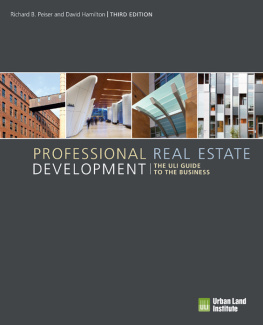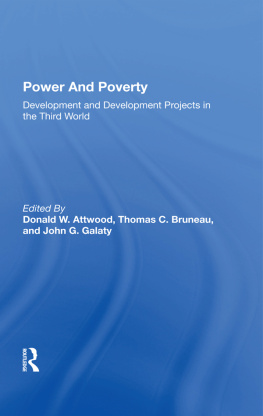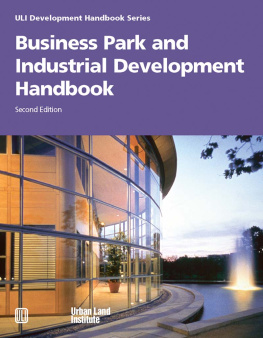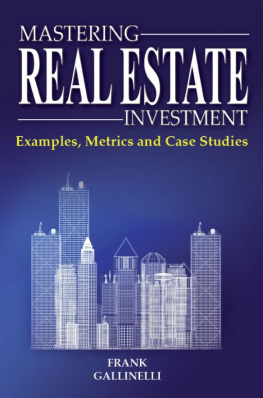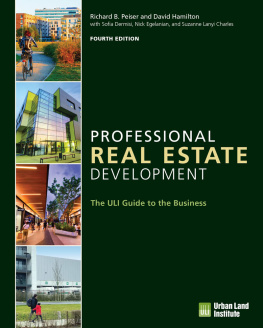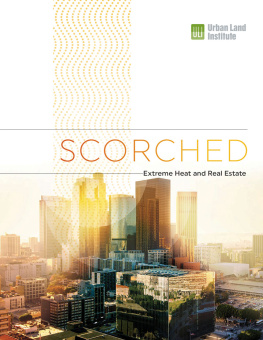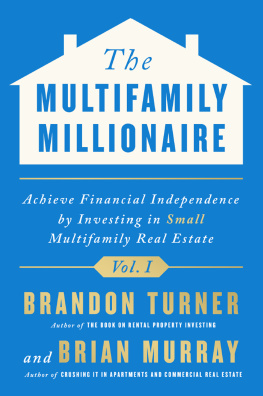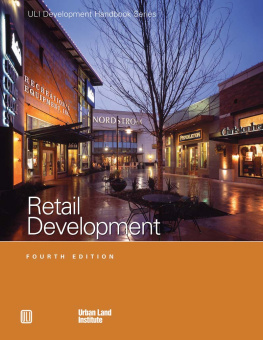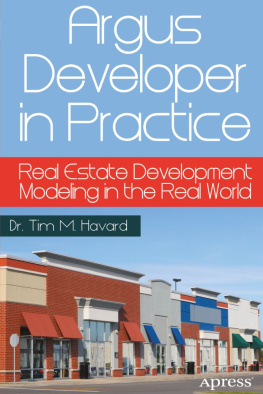Richard B. Peiser and David Hamilton | THIRD EDITION

PROFESSIONAL REAL ESTATE DEVELOPMENT
THE ULI GUIDE
TO THE BUSINESS

Copyright 2012 by the Urban Land Institute
Printed in the United States of America. All rights reserved. No part of this book may be reproduced in any form or by any means, electronic or mechanical, including photocopying and recording, or by any information storage and retrieval system, without written permission of the publisher.
Urban Land Institute
1025 Thomas Jefferson Street, NW
Suite 500 West
Washington, DC 20007-5201
Recommended bibliographic listing:
Peiser, Richard B., and David Hamilton. Professional Real Estate Development: The ULI Guide to the Business. Third Edition. Washington, D.C.: Urban Land Institute, 2012.
Library of Congress Cataloging-in-Publication Data
Peiser, Richard B.
Professional real estate development : the ULI guide to the business / Richard B. Peiser and David Hamilton. 3rd ed.
p. cm.
eISBN 978-0-87420-277-9
1. Real estate development. I. Hamilton, David. II. Title.
HD1390.P45 2012
333.3068dc23
2012016521
ULI Catalog Number: P101
About the Urban Land Institute
The Urban Land Institute is a nonprofit research and education organization whose mission is to provide leadership in the responsible use of land and in creating and sustaining thriving communities worldwide.
The Institute maintains a membership representing a broad spectrum of interests and sponsors a wide variety of educational programs and forums to encourage an open exchange of ideas and sharing of experience. ULI initiates research that anticipates emerging land use trends and issues, provides advisory services, and publishes a wide variety of materials to disseminate information on land use development.
Established in 1936, the Institute today has nearly 30,000 members and associates from some 92 countries, representing the entire spectrum of the land use and development disciplines. Professionals represented include developers, builders, property owners, investors, architects, public officials, planners, real estate brokers, appraisers, attorneys, engineers, financiers, academics, students, and librarians.
ULI relies heavily on the experience of its members. It is through member involvement and information resources that ULI has been able to set standards of excellence in development practice. The Institute is recognized internationally as one of Americas most respected and widely quoted sources of objective information on urban planning, growth, and development.
_______________
Project Staff
Gayle Berens
Senior Vice President
Education and Advisory Group
Adrienne Schmitz
Project Director and Editor
Senior Director, Publications
James Mulligan
Managing Editor
Joanne Platt
Publications Professionals LLC
Manuscript Editor
Betsy VanBuskirk
Creative Director
John Hall Design Group
Book and Cover Designer
www.johnhalldesign.com
Craig Chapman
Senior Director, Publishing Operations
About the Authors
RICHARD B. PEISER
Richard B. Peiser, PhD, is the first Michael D. Spear Professor of Real Estate Development in the Department of Urban Planning and Design at the Harvard Graduate School of Design (GSD) and director of the university-wide Real Estate Academic Initiative. Before coming to Harvard in 1998, he was associate professor of urban planning and development at the University of Southern California where he founded and directed the Lusk Center for Real Estate Development, and the Master of Real Estate Development Program.
At Harvard, he founded and directs the Advanced Management Development Program and coordinates the other executive education programs in real estate at GSD, as well as joint real estate programs with Harvard Business School. He directs the Master of Urban Planning Concentration in Real Estate and cochairs the Master of Design Studies Program in Real Estate and Project Management at GSD.
Peiser has published over 100 articles in academic and professional journals. His primary research focuses on developing an understanding of the response of real estate developers to the marketplace and to the institutional environment in which they operate, particularly in the areas of urban redevelopment, affordable housing, and suburban sprawl. His current research is on urban modeling using Los Angeles as a test case, and nonperforming loan resolution. His other books in progress are on high-end luxury retail development and on the economics of new towns around the world. He teaches real estate development and finance as well as field studies on complex urban development problems.
Professionally, he has developed affordable housing in Texas and California as well as land and industrial properties. From 2004 to 2007, he served as a founding partner of the China Real Estate Investment Company and its Shanghai-based subsidiary KaiLong REI Project Investment, investing institutional capital in real estate projects in Chinas major cities. He is also a valuation and economic-damage expert for litigation with respect to apartments, land, office, and retail development projects and portfolios.
Peiser was born in Houston and grew up in Dallas. He received his BA from Yale University, his MBA from Harvard University, and his PhD in land economy from Cambridge University. His first teaching appointment was at Southern Methodist University in Dallas. He has held visiting appointments at Stanford and Cambridge universities, Seoul National University, the University of Ulster, and the University of Regensburg. He is a former trustee of the Urban Land Institute and former coeditor of the Journal of Real Estate Portfolio Management and currently serves on the board of Berkshire Income Realty, Inc., a publicly traded company based in Boston, and on the Board of Overseers for the New England Wildflower Society.
DAVID HAMILTON
Trained as an architect, David Hamilton has managed innovative real estate development projects on a variety of scales, ranging from medical and university campuses to award-winning high-tech office and R&D spaces. As a codirector of the Cambridge Innovation Center, he managed the design and construction of a widely acclaimed private sector incubator for technology-related business. As a principal of Qroe Farm Preservation Development, Hamilton led project design, entitlement, and construction efforts for Bundoran Farm in Charlottesville, Virginia, widely regarded as a model for sustainable development. He speaks and writes on the role of private sector development in the management and preservation of large-scale working landscapes, and the implications of exurban development on agricultural land uses. As chief operating officer of Qroes affiliate Geobarns, he has been recognized as a leader in the development of new models of sustainable, affordable homebuilding and light commercial construction.
Hamilton has contributed to various ULI publications on topics ranging from inner-ring suburban regeneration to conservation development strategies. He teaches introductory real estate finance and development courses and advises design students on project economics at Harvard Universitys Graduate School of Design. He is a graduate of Middlebury College and Harvard University, where he cowrote

